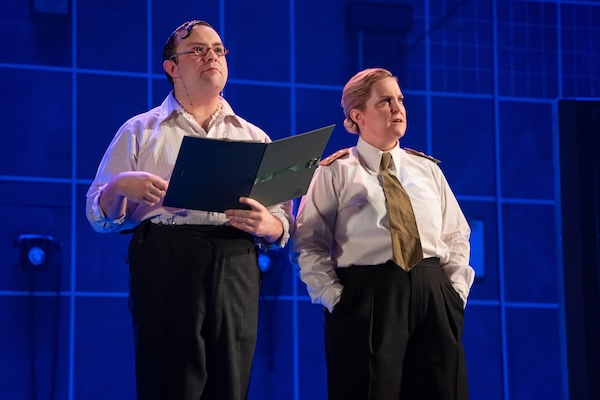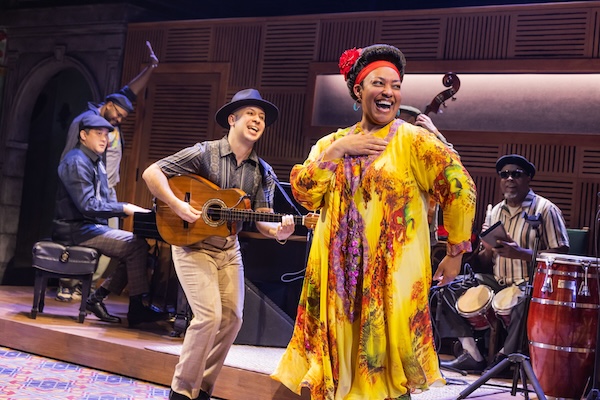Theater Reviews: “Operation Mincemeat” and “Buena Vista Social Club” Reflect a Banner Year for Broadway Musicals
By Christopher Caggiano
A clever British import and a soulful Cuban music-fest reflect a season that delivers the full range of musical storytelling Broadway’s been missing.
Last year, Broadway fans had their choice of fifteen new musicals – the most new tuners in a single season in decades. But, at least to me, not one of those shows felt like a true standout, at least not artistically. Three of those shows – The Outsiders, Hell’s Kitchen, and The Great Gatsby – have found commercial success. This in itself is remarkable: most recent seasons have only produced one genuine hit.
But while each of those shows had elements of brilliance, none of them cohered in terms of great storytelling, rich characterizations, and finely crafted words and music. The Outsiders and Hell’s Kitchen are certainly worth seeing, although Gatsby is basically a Disneyfied classic novel with a pretty set.
This Broadway season already feels different. At this point in the season, there are four new musicals that each outshine anything from last season: Maybe Happy Ending, Operation Mincemeat, Buena Vista Social Club, and the upcoming Dead Outlaw, which I was lucky enough to see Off Broadway. Even Death Becomes Her, a musical that makes no claims to being high art, still reflects more craft than Gatsby does.
Let’s take a closer look at Operation Mincemeat and Buena Vista Social Club, which I had the pleasure of seeing last week.
Operation Mincemeat

Jak Malone and Zoë Roberts in Operation Mincemeat. Photo: Julieta Cervantes
I was predisposed to fall for the British import Operation Mincemeat going in, but then I’m an inveterate anglophile. The show has drawn plenty of comparisons to Monty Python, and with good reason: it’s clever, fast-paced, and unapologetically British. But underneath all the silliness is something sharp and heartfelt. It’s a rare musical that can make you laugh so hard while also sneaking up on you with moments that catch you off-guard with their emotional power.
The story of Operation Mincemeat is based on a real World War II operation in which British intelligence officers attempted to fool Nazi forces by planting fake invasion documents on a corpse and setting it adrift off the coast of Spain. (Interestingly, this is not the only musical this season that prominently features a corpse, the other being Dead Outlaw.) The idea behind the mission was to divert German forces away from Sicily and toward Sardinia.
The show takes this odd little footnote of military history and spins it into a darkly comic caper, blending spy-thriller tension with interpersonal intrigue and a generous dose of pathos. Even if you walk in knowing how the story turns out, the show keeps you guessing with smart narrative twists and cleverly managed stakes.
The cast is made up of five actors, but I didn’t realize that right away. Everyone plays so many roles – sometimes within the same scene – that I spent a decent chunk of the first act assuming there had to be more people hiding backstage. Every member of the ensemble is exceptional, and the comic timing is some of the sharpest I’ve seen in years.
Jak Malone might be the standout, a first among equals, as it were, as the character Hester, a sort of Mama Bear to the operation. Hester is asked to write a love letter to go in the dead man’s briefcase – a detail meant to make the fake identity seem more real. At first, it seems like a bit of romantic fancy but, as the song unfolds, it becomes clear that Hester is drawing from her own life, and from a personal loss that dates back to World War I. Malone barely moves during the number, and yet he commands the entire theater. It’s a stunning moment. (I even got chills typing that sentence.)

The cast of Operation Mincemeat. Photo: Julieta Cervantes
Perhaps the only – and very minor – drawback in the performances comes from the otherwise talented and engaging David Cumming as Charlie, the nerdy brain behind the plan. Overall, he’s funny and effective, but his performance is occasionally overly mannered and crosses over into distracting. Even so, the character is well-drawn and a key part of the show’s emotional arc.
It wasn’t until after the show when I was reading through the Playbill that I realized something even more remarkable about the talented cast: they also wrote and devised the show. So, they’re sort of the musical version of the Mischief Theatre troupe, the ones responsible for The Play That Goes Wrong and its numerous offshoots. But Mischief’s shows are intentionally ridiculous. Operation Mincemeat borders on sublime.
One complaint I’ve heard recently about Mincemeat is that the often rap-like lyrics are pretty dense. To an extent this is a fair point. Many of the songs feel like walls of verbiage that require active listening to keep up with. I’ve heard people suggest listening to the London cast recording before seeing the show.
But, um, here’s a thought, folks. Did you see Hamilton? Did you catch every single word of Thomas Jefferson’s second act rap or the cabinet battle? Probably not. But then you listened to the cast recording and enjoyed the show all the more when you got to savor every line. (Admittedly, I’m not the biggest Hamilton fan, but the comparison is still apt.)
What’s more, and again much like Hamilton, Operation Mincemeat features masterful extended sequences and complex storytelling. The number “Just for Tonight” is one of the show’s high points in this respect. The song shifts back and forth between two locations – a nightclub where members of the team are celebrating what they think is a successful mission, and a submarine where the plan is very much still in progress and not exactly going well. The sequence is not only dramatically efficient, but also a ton of fun because it balances premature triumph and rising tension.
The staging, care of director Robert Hastie and choreographer Jenny Arnold, is tight and meticulously timed, reminiscent of the clever stagecraft in shows like another British import, The 39 Steps. You can tell these performers have been living in this show for a while — and they are still having the time of their lives. Transitions are fast but clear, and the use of costume, props, and space is smart and efficient. The show barrels forward with the momentum of a farce, but I never lost track of what’s happening. The production is high energy from start to finish – almost exhausting at times – but it’s also exhilarating.
Along the way, there are some lines that really stuck with me. At one point, Montagu, one of the mission leaders, says, “Look, the world is a mess, Charlie. Small flashes of joy, it’s all any of us can hope for.” The show may have been written in 2019, but that’s a sentiment that both Americans and Brits can savor and derive solace from today.
Buena Vista Social Club

A scene from Buena Vista Social Club. Photo: Matthew Murphy
If Operation Mincemeat thrives on rapid-fire wit and theatrical ingenuity, Buena Vista Social Club takes a different path – slower, more soulful, and just as rewarding. The remarkable thing about Buena Vista Social Club is that it radiates emotional authenticity and political undercurrents without ever tipping into maudlin nostalgia or angry agitprop. It’s a tightly packed production that never overplays its hand.
The talent on stage is overwhelming – singers, dancers, and musicians working toward a common purpose – and the show finds a thrilling balance between jubilation and grounded, often painful storytelling. While many musicals can’t resist the urge to tack on a mini concert or megamix to leave the crowd cheering (I’m looking at you, Six), this one opts for restraint. At a lean two hours, it knows when to let the final note hang in the air.
The show traces the life and music of Cuban singer Omara Portuondo, moving back and forth between the ’50s and the ’90s as she reckons with personal loss, political upheaval, and questions of legacy. It plays like a memory piece – fluid and poetic – with Omara revisiting moments that defined her life. One of the most affecting threads concerns her internal conflict: Should she continue making music for her people or become a popular success with tourists, i.e. preserve her culture or entertain the dilettantes?
That tension – between history and memory, authenticity and performance – is woven throughout the show. “Some of what follows is true,” says record producer and part-time narrator Juan early in the show, “some of it only feels true.” The production leans into that ambiguity. It also touches, gently but persistently, on the role that racism played in shaping Omara’s relationships and her place in the Cuban music scene.
All of the songs are in Spanish, but you don’t need subtitles to understand what they mean. As in opera, the emotion does the work. The band – visible on stage throughout – acts as both ensemble and emotional engine, tying the two timelines together with the sound of this music. As Compay puts it, “These songs aren’t beautiful because we wrote them that way. They’re beautiful because we lived them.”

A scene from Buena Vista Social Club. Photo: Matthew Murphy
I’m usually skeptical of musical showboating – you know, when everyone in the band gets a solo and attendant applause break. But here, the spotlighting of individual band members at the top of Act Two felt like a moment of earned celebration. The sheer talent is just that compelling.
Dance plays an equally central role in the production. Patricia Delgado and Justin Peck (the latter a richly deserved Tony winner for the recent Carousel revival) have created choreography that doesn’t decorate the music so much as amplify it. Through canons of movement, counterpoint, and intersecting diagonals, the six principal dancers create a kinetic language that mirrors the emotional current of the show.
The cast is simply outstanding. Isa Antonetti, as young Omara, is a genuine breakout – her voice has both clarity and weight, and when she sings, you believe every note. She possesses one of the richest, most powerful voices I’ve ever heard. Natasha Venetia Belcon, who some may remember as the original Gary Coleman in Avenue Q, plays older Omara with wit, charisma, and a profundo voice that anchors the show. Julio Monge, as musician and professional smooth guy Compay, brings dry humor and emotional depth to his role, acting as a kind of street philosopher with a guitar.
The book, by Marco Ramirez (of TV’s Daredevil and Orange Is the New Black, and Off-Broadway’s The Royale), is efficient and elegant. Although the show’s main features are music and dance, the foundation of the show lies in story and character. Simple lines reflect both the wisdom (“It’s not your fault the world made us take sides.”) and naiveté (“No matter how bad things get out there, there’s nothing a song can’t fix”) of the characters. I hope we see more of Ramirez’s spare yet resonant style very soon.
Together, Operation Mincemeat and Buena Vista Social Club highlight just how much variety and quality this season’s new musicals have to offer. One spins a bizarre piece of wartime history into a sharp-edged comedy, while the other draws on memory and music to explore a life shaped by music, politics, and loss. Both arrive with clarity and purpose, and both serve as reminders of what the Broadway musical, carefully wrought, can accomplish.
Christopher Caggiano is a freelance writer and editor living in Stamford, CT. He has written about theater for a variety of outlets, including TheaterMania.com, American Theatre, and Dramatics magazine. He also taught musical-theater history for 16 years and is working on numerous book projects based on his research.

Operation Mincemeat was a huge disappointment. Saw The Outsiders last night which was incredible. Have never left a show at intermission in my 30 years of attending Broadway and off-Broadway shows, but left this one. Waste of money.
I love it the music the songs the history everything was so beautiful,
I’m so happy to see it, thanks to my daughter I recommended to everyone
To go see it